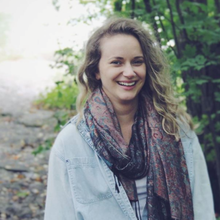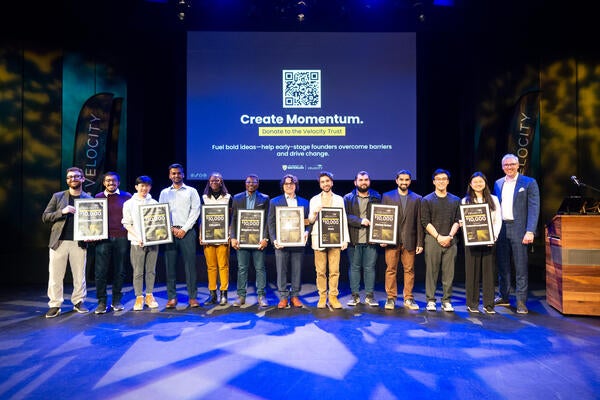
Three steps to stay productive during uncertain times
Entrepreneur and mindset coach Danielle Ryan (BES ’14) shares practical actions with fellow alumni

Entrepreneur and mindset coach Danielle Ryan (BES ’14) shares practical actions with fellow alumni
By Megan Vander Woude Office of AdvancementIn our recent webinar series, Waterloo alumni share their passions and expertise to support others during this strange time.
 As millions physically distance to prevent the spread of COVID-19, life continues in the privacy and isolation of our homes. While we may not be able to control the current state of affairs in the world, we can control our perception & use it as fuel to spark our creativity.
As millions physically distance to prevent the spread of COVID-19, life continues in the privacy and isolation of our homes. While we may not be able to control the current state of affairs in the world, we can control our perception & use it as fuel to spark our creativity.
Danielle Ryan is a 200hr Registered Yoga Teacher and Mindset Coach. She’s also the owner and operator of Lifestyle By Design Studio, where she curates private yoga classes, guided meditations and coaching services. Here’s the three-step process and practical tips she offered to alumni who want to stay productive and unlock creativity during uncertain life stages.
Ask yourself: what do you want?
Think about the things you’d like to achieve or do. It could be something related to your job, like getting through all the emails in your inbox or launching a new product. Or maybe it’s something completely different, like a home renovation, trying a new hobby or starting a podcast.
Danielle suggests that you write down your ideas on a piece of paper. Create a short list of five options, then pick one to focus on.
Why do you want to do this? Try to come up with three reasons. Again, Danielle suggests that you write your thoughts down on a piece of paper.
If you want to organize your inbox, your intention might be to relieve some stress or feel organized in your job. If you want to knit a blanket, your intention could be to feel more creative or make a heartfelt gift for a loved one.
Whatever your reasons, make them personal and based in emotion. This will motivate you to achieve your task.
DANIELLE RYAN, Entrepreneur and Mindset Coach
Every day, our actions that we take are weaving the fabric of our entire lives. Every day and every action that we take is equally as important in creating the life we want.
Danielle encouraged us to stop waiting for the “right time” and take action now. Begin by finding a single action that will help you work toward your desired outcome. Even small actions can provide a sense of accomplishment and positive feedback, which will motivate you to do more.
If you’re feeling overwhelmed or unsure where to start, Danielle also offered practical tips to stop waiting and start taking action.
First, break things down into very small and specific steps. What skills or resources will you need? Who do you need to contact for help? Breaking things down into a simple task list will help you make an achievable plan.
Second, schedule these tasks in your calendar. Danielle blocks off sections of time in her daily calendar for simple tasks, like checking her inbox or writing her podcast scripts, to create a sense of accountability.
Third, check in with your progress regularly. While you’re adding tasks to your schedule, book some time to reflect on what you’ve done and what actions weren’t helpful. Be honest with yourself, and change your plans if you need to.
Finally, have some fun. Sometimes your mind needs a break, and the best ideas can come when you’re scrolling through your phone, playing a game or taking a walk.

Read more
Redefining capstone learning by bringing students, faculty and community partners together to tackle real-world challenges

Read more
Here are the people and events behind some of this year’s most compelling Waterloo stories

Read more
From non-invasive health care solutions to sustainable construction material and AI-driven coaching, the funding supports future-centric ventures
The University of Waterloo acknowledges that much of our work takes place on the traditional territory of the Neutral, Anishinaabeg, and Haudenosaunee peoples. Our main campus is situated on the Haldimand Tract, the land granted to the Six Nations that includes six miles on each side of the Grand River. Our active work toward reconciliation takes place across our campuses through research, learning, teaching, and community building, and is co-ordinated within the Office of Indigenous Relations.